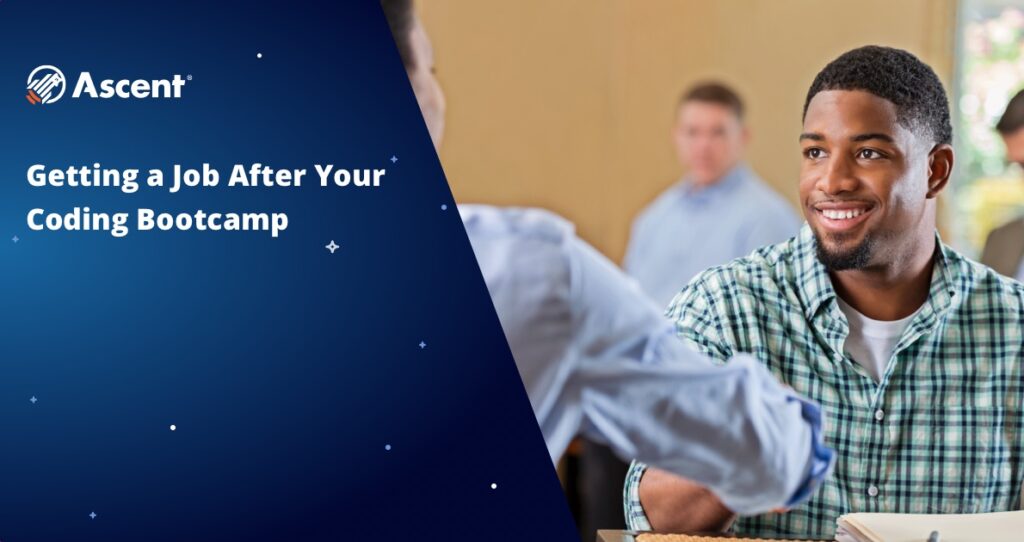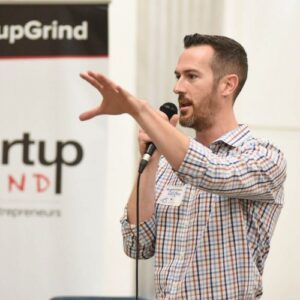Getting A Job After Your Coding Bootcamp: 8 Tips to Prepare You For the Job Hunt

Attending a coding bootcamp is a big investment of your time and energy. Still, it doesn’t guarantee you a job after graduation. Once all your assignments are complete, and you can see the end in sight, you will need to prepare for your last project – getting a job after your coding bootcamp.

We recently sat down with TJ Kinion, Program Manager and Career Services Director at LearningFuze. TJ has the unique opportunity to mentor students as they prepare for the job hunt after leaving their bootcamp. Whether it’s resume help, LinkedIn optimizations, or interviewing tips, TJ loves every aspect of the job search process and is passionate about sharing his knowledge with students.
Whether you’re preparing for the job hunt early or getting ready to graduate soon, here are 8 tips TJ shared for getting a job after your coding bootcamp.
Tip #1: Don’t underestimate your resume and cover letter.
Your resume and cover letter should explain why a recruiter or hiring manager should talk to you. Do you have the skills and experience that they’re looking for?
Make sure you dedicate plenty of time before starting your job search to craft a resume and cover letter that best highlights you and your personal brand.
If you need help getting started, research open jobs that you would be interested in applying for in the future. What qualifications is the company looking for in the ideal candidate? Do they list technology platforms you may be familiar with using?
As TJ suggested, “Your resume gets you the audition, but once you’re in front of them, you have to show them what you’ve got.” That means you have to sell yourself, your experience, and convey your story of where you started and where you plan to go after your coding bootcamp.
Tip #2: Practice answering common interview questions.
In the words of TJ, “The skills you learn at your coding bootcamp will get your foot in the door at your next job interview, but your soft skills will set you apart from the competition.”
Your soft skills can be anything from how you communicate with a manager, how you work together on a team, or how you stay organized to meet project deadlines.
Once you’ve finalized your resume and cover letter, now’s the time to practice answering a few common interview questions. Don’t assume the hiring manager or recruiter has reviewed your resume beforehand, so make sure you continue to highlight your past work experiences and skills.
We’ve provided a few common interview questions below with suggestions from TJ on how best to answer them.
“Tell me about yourself.”
The very first thing you’ll probably get asked to do is to share a little bit about yourself. According to TJ, this allows you to talk about recent projects you’ve been working on (this can even include assignments from school or freelance work you do on the side).
“How you choose to answer this question will really set the tone for the rest of the conversation,” said TJ. “More than likely, the hiring manager or recruiter will pull something from your projects or experiences to focus on for the next few questions.”
The art of getting a job after your coding bootcamp is finding the balance to highlight your hard skills – the technical skills you learned at your coding bootcamp – with your soft skills.
Take some time to think about 2-3 recent projects you’ve been working on that really highlight your hard and soft skills equally. This can really make the difference in setting you apart from another candidate.
“Tell me about a time you had a bad experience with a coworker or client.”
It can be incredibly intimidating to talk about a bad experience with a coworker or client. Still, there is a way to craft your response in a more positive light.
If the end result was positive for everyone, make sure you speak to how you got everyone in agreement in the end. If the result was less positive, explain what you learned from the experience and how you might do things differently next time.
“It’s important to understand that when a hiring manager or recruiter asks this question, they want to know how you grew from the experience,” said TJ. “Being aware of the situation is a great first step in finding a solution, and it can help you avoid a similar situation in the future.”
“Tell me about a project that you’re really proud of.”
This is time for you to brag about yourself a little and show your future company what is really interesting to you – this may be your key to getting a job after your coding bootcamp.
TJ’s secret to answering this question is to think of a puzzle. When you open a puzzle, you get to see what it will look like before you even begin piecing it together, so answer this interview question the same way. Explain the project and what the end result was, then go back and explain how you got to that result. Your project should solve this problem.
If this is early in your interview process, you may be speaking to a non-technical person, so don’t start describing the pieces first. If you are talking to someone with a technical background similar to yours, speak their language and highlight core programs they may know. In the words of TJ, “Play it safe by getting nerdy.”
“Why do you want to work here?”
The majority of your interview will be on your past work experiences and projects. Still, this interview question is one of the rare instances where you get to focus on your future.
According to TJ, “You’re making a big life decision. About 60% of your time will be spent at your future job, so if you don’t care about getting to know the company you’re about to work for, then you’re already wasting your time.”
As you explain why you want to work at the company, you’ll show the interviewer who you are, what’s important to you, and how easy you are to work with.
If you don’t have a chance to practice answering common interview questions, just make sure you really know your resume. Everything you list on your resume is a potential interview question from the person on the other side of the conversation. Make sure you dedicate plenty of time before your interview to really research other common interview questions before your big day.
“I’ve never heard a student say, ‘I over-prepared for that interview,’ said TJ. “What I hear most is, ‘That was tough,’ or ‘I didn’t think of that question.’
Tip #3: Don’t leave anything on the table during your interview.
The interview questions you choose not to answer can be even more telling than the ones you do. This doesn’t necessarily mean you stay silent after the hiring manager or recruiter asks a question. This can include, “I don’t know” or “I’ve never heard of that program before.”
“Saying ‘I don’t know’ is a safe play, but it doesn’t get you the job,” said TJ. “If a recruiter asks you about a platform that isn’t on your resume, they’re trying to figure out how you would handle the situation.”
If you’re asked a question you don’t know the answer to, kindly let the interviewer know you’re not familiar with the technology, but you’re going to look into it after the interview (then write it down on the back of their business card or in your notes, so you don’t forget).
Tip #4: Prepare 5 questions for your interviewer.
The hiring manager or recruiter just spent about 30 minutes asking you questions. Make sure you take some time to ask them questions, as well – plus, they’re expecting it!
A few questions from TJ that you may consider asking are:
- Why do you like to work here?
- What has made someone really successful or a rockstar on your team?
- Do you have any hesitations about me getting hired?
Having a minimum of 5 questions ready to ask the interviewer will help you have some prepared as a backup in case 1-2 are answered during your interview. If you need help getting started, look up the person you’re interviewing with on LinkedIn and find potential questions. Do you have any common interests or did you graduate from the same alma mater?
Tip #5: Make sure you end the interview with clear next steps.
Before you leave the room or log off the Zoom call, make sure you answered everything the recruiter or hiring manager needed, and your next steps are clear. A few great final questions may be:
- Is there anything I haven’t answered today for you?
- Will there be another round of interviews?
- How soon can I expect to hear back from the company?
- Do you plan to follow up by phone or email?
If they already answered these questions for you, simply restate that you’re excited about the opportunity to work at the company. It may sound weird to say this out loud, but sharing how excited you are to join the team can be a deciding factor for the interviewer.
Tip #6: Give them something to remember you by as they make their decision.
Remember that program you didn’t know during your interview? Once you’ve had a chance to research the answer on your own, find that business card and draft a follow-up email thanking the recruiter or hiring manager for their time.
This is your second chance to answer the tough question with more clarity. In your email, reference the question again and let them know you’ve done your homework. This will show the interviewer that you’re invested in the company before you even start working there.
If you didn’t face a tough interview question, your follow-up email should include something unique that will set you apart from other candidates and should be sent within 24 hours of your interview. You may also choose to send a memorable handwritten card sharing how excited you are about the opportunity.
Tip #7: Put yourself in the hiring manager’s or recruiter’s shoes.
The recruiter or hiring manager isn’t a villain, and they’re not trying to put you in a corner. If they ask a tough question, it’s because they’ve faced a similar situation in the past.
Recruiters and hiring managers are people too, and they’ve got a job to do. Their goal is to fill an open position on their team with someone who is both a fit for the role and best represents the company’s values. Show them that you’re willing to learn and appreciate their time.
“Your future company is determining if you are someone they want to invest in,” said TJ. “It’s kind of like dating. If you’re not going to be kind or put yourself out there, you’re not going to find your significant other.”
Tip #8: Getting a job after your coding bootcamp can be a full-time job on its own. Take it seriously.
Last but certainly not least – be patient and positive through this process.
You may not get the first job you apply for, but that doesn’t mean you give up. Use every job interview as an opportunity to practice and get better every time.
Whether you’re preparing for your first interview or getting a head start on the job hunt, it’s important to understand that you’re going to make mistakes along the way. As TJ suggested, “You don’t need to be perfect; you just have to be a really good version of yourself.”
For more tips on how to prepare for a phone or video interview, read the blog below.
More About TJ Kinion
TJ spent four years as an IT recruiter for the third-largest staffing firm in North America. After realizing recruiting wasn’t for him, he turned to code and ultimately decided to attend LearningFuze on his own. During his time there, TJ got a job in LearningFuze’s career services department. He spends most of his time finding new ways to support students before, during, and after their coding bootcamp.



